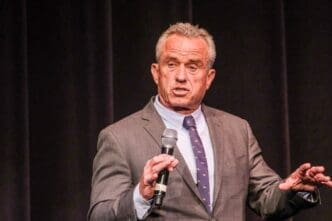Over the past two months, Robert F. Kennedy Jr., the newly appointed federal health secretary, has implemented significant changes at the Department of Health and Human Services. These changes include the dismissal of 10,000 public health workers and discussions with state governors concerning the restriction of unhealthy foods in taxpayer-funded programs. During this period, he has also delivered mixed messages on vaccines, as measles outbreaks have affected hundreds across the United States. Recently, Kennedy committed to identifying some causes of the increasing autism rates within six months.
While Kennedy’s initiatives, labeled “Make America Healthy Again,” have been praised by his supporters, including health-conscious parents and Republicans loyal to President Donald Trump, scientists and public health experts have voiced concerns about his statements on diets, vaccines, measles, and autism. These concerns are particularly focused on the factual accuracy of some of Kennedy’s claims regarding health issues.
Autism
Kennedy has claimed that autism rates in the U.S. have dramatically increased from “1 in 10,000” during his childhood to “1 in 31,” according to recent studies by the Centers for Disease Control and Prevention (CDC). He attributes this rise to environmental exposure. However, while autism was indeed rarely diagnosed in the past, the definition of autism has expanded to encompass a spectrum of related conditions, resulting in more cases being recognized. The term “epidemic” is generally reserved for rapidly spreading diseases, a definition that autism does not meet. Health officials attribute the rise in autism diagnoses to improved recognition and diagnosis rather than an actual surge in cases.
Kennedy has previously associated childhood vaccines with autism, a claim refuted by numerous studies, including those by the CDC. A notable study once claimed a link between the measles, mumps, and rubella (MMR) vaccine and autism, but it was retracted due to fraudulent data. Kennedy has announced plans for a major study on autism causes, initially promising answers by September, but he has since tempered expectations by stating that only some answers may be available by then.
Vaccines
Kennedy has expressed skepticism about vaccines, suggesting in an interview that they can cause serious adverse events. Contrary to these claims, the measles vaccine is considered safe, with its risks being significantly lower than those associated with measles complications. There have been no documented deaths from the MMR vaccine in healthy individuals. Common side effects are mild, and while there is a small risk of febrile seizures, the vaccine is recommended as early as possible to mitigate risks. Allergic reactions are rare, and individuals allergic to neomycin are advised not to receive the vaccine.
In another interview, Kennedy claimed that the measles vaccine’s effectiveness wanes quickly, but medical experts and the CDC assert that it provides long-lasting protection. Two doses of the vaccine are 97% effective, and high vaccination rates are crucial in preventing outbreaks.
Measles
In a discussion about a child’s death in Texas, Kennedy suggested that complications, not measles itself, were to blame. However, health officials confirmed the child died from measles complications, and the child was not vaccinated. Complications from measles can lead to severe outcomes, including death, in a small percentage of infected children.
Kennedy also mentioned treatments for measles involving budesonide and clarithromycin, but pediatricians warn there is no cure for measles, and the use of these drugs for treatment is not recommended. Vaccination remains the most effective preventative measure against measles.
Nutrition and Obesity
Kennedy has stated that 70% of Americans are overweight or obese, compared to 3% during the early 1960s. While current statistics show that nearly three-quarters of Americans fall into these categories, historical data indicates about 13% had obesity in the early 1960s. The increase in obesity is linked to various factors, including changes in the food supply and lifestyle shifts.
Regarding food dyes, Kennedy claimed they affect academic performance and behavior, but scientific evidence primarily links them to neurobehavioral problems in some children. The U.S. Food and Drug Administration notes that most children do not experience adverse effects from color additives.
In a speech, Kennedy mentioned a dramatic rise in diabetes in China, suggesting a 50% prevalence today. However, studies show the prevalence has increased from 6.1% in the early 2000s to 12.4% recently, driven by factors like urbanization and lifestyle changes.








